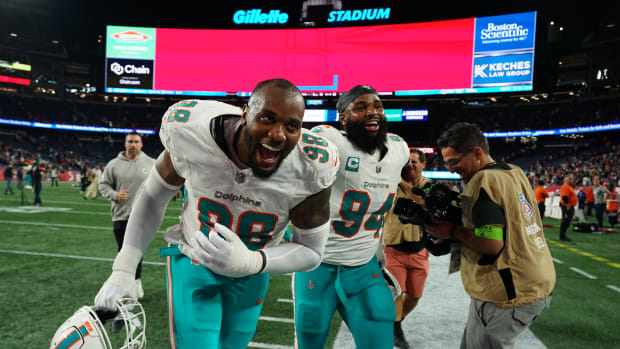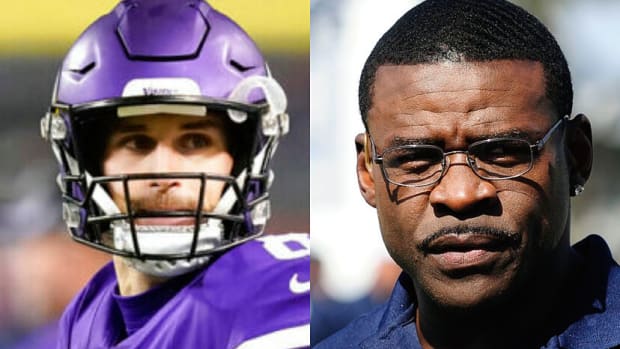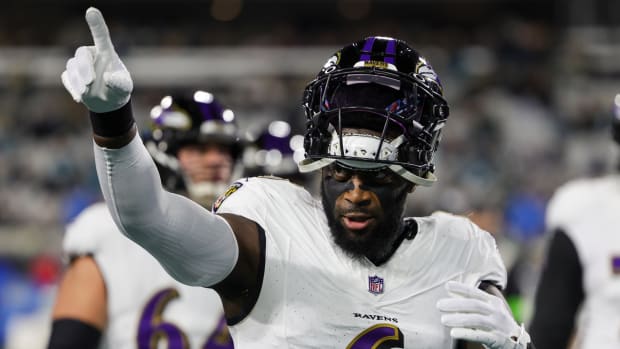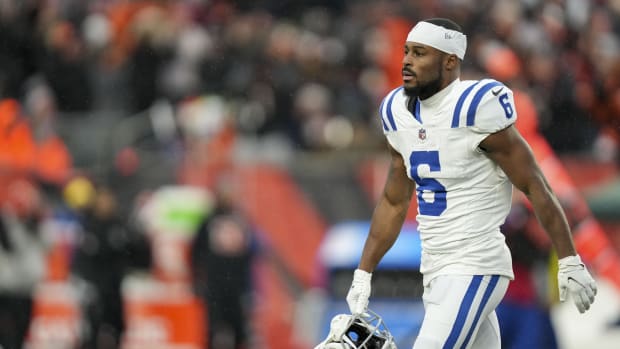Football in America: A Family Game in Minnesota
Welcome to The MMQB’s eight-part series, “Football in America,” in partnership with State Farm. We’ll take the temperature of the game at the youth, high school, college and NFL levels in a changing world, in eight locales across the United States. This week: Episode III—Minneapolis and environs.
Football in America, Episode I: The Bay Area
Football In America, Episode II: Charlotte
Video: Steve Raum
WHERE THE LANDSCAPE FORMS A STADIUM
Cleveland, Minn.
Friday, 7 p.m.
They don’t call it nine-man football here. Here it’s just football.
As the sun sets on Cherry Creek and the row of trees that separate the water from the high school field, the Cleveland High band gathers underneath the scoreboard to play the national anthem. This no-stoplight town’s official population is just 719 people, but tonight about 1,000 fans gather on The Hill, for Homecoming. Band director Erik Hermanson gestures discreetly for a long drum roll, and the elderly American Legion members slowly raise the flag.
After the final note of the anthem (for which all stand), Hermanson waves his band off the field and jogs over to the sideline, where the Clippers are lined up and waiting. Normally, quarterback Carter Kopet plays trumpet and his prolific receiver, Austin Plonsky, plays trombone, but not tonight. An assistant coach hands Hermanson a headset and a clipboard. Because in a town as small as Cleveland, the band director is also the co-coach.
Hermanson, who has coached the football team in Cleveland for 22 years and directed the band for 24, says he’s never been tempted to leave for a program with 11-man football: “I always wanted to be a head coach, and I've always wanted to be a band director, and there aren't many schools you can go to where you could do both.”
In Cleveland, The MMQB staff—on a mission to cover a youth, high school, college and pro football games all in one weekend—is treated to an all-natural setting for the game. There are two small sets of bleachers dotting an expansive hill, forming a bowl as it winds around the end zone, flattens, and melts into the woods. The athletic director long ago tried to talk local pig farmers out of airing out their barns on Friday afternoons, to no avail. The unmistakable smell of slop and pig manure scents the air as the home fans unfurl orange and black blankets.
“Can’t they do it on Thursday?” athletic director Rich Kern says with a laugh. “We’re playing a game here!”
On this night, the Clippers steamroll the Granada-Huntley-EC/Truman Jaguars, 76-0. There are no offensive tackles in the nine-man game, which makes team speed a major advantage. Just five minutes into the first quarter, Plonsky, the senior receiver, jets past his man coverage and scores his 41st career receiving touchdown, tying the state record held by Michael Floyd, now with the Vikings. Plonsky didn’t say much to his parents about the record beforehand. “I can’t hardly get a word out of him,” says his father, thrilled after watching his son make state history. “He’s just a soft-spoken kid.” Just then, Plonsky streatched out and caught his second touchdown pass of the night. “Another one!” his dad screamed. “Attaboy!”
Kopet and Plonsky live three houses apart on Cleveland’s Columbia Street, where they’ve spent their entire lives. Kopet own a few state records of his own—completions, passing yards, touchdown passes and total touchdowns. Last season Cleveland had their most successful finish in school history, as state runner-ups.
Kopet once felt stuck in Cleveland and dreamed of escaping someday, but now he’s playing his last season as Clippers quarterback and beginning to appreciate the little things that make his quiet hometown special. “Alls I ever wanted to do was, Oh I want go play at a big school, I want to get out of just this little town,” he says. “But the older you get, the more you appreciate something like this, because there are a lot of kids that don’t get this opportunity, where they almost go under the rug and you're just a number, rather than a person. I wouldn't trade this community for the world.”
EVERYONE PULLING TOGETHER
Minneapolis
Saturday, 11:00 a.m.
From Cleveland we travel and hour and a half north, through wending country highways and fields of unending amber until we’re parked on the campus of the University of Minnesota. Every third student traipsing from dorm rooms and off-campus housing to a string of bars in the shadow of TCF Bank stadium is wearing maroon-and-gold striped overalls, purchased for $54.99 before tax at the school bookstore.
This is the hoopla Kopet was talking about. Minnesota Gophers football under wunderkind first-year coach P.J. Fleck is experiencing a marketing revival and an identity makeover.
When he became the first coach to win his debut at Minnesota since 1986, with the Gophers hosting and defeating Buffalo 17-7, Fleck accepted a game ball from athletic director Mark Coyle with a caveat and nod to a slogan popularized during his successful four-year run at Western Michigan.
“I was very honored, but that game ball was not for me,” Fleck said last month. “That game ball was for our players. That game ball was for our boosters. That game ball was for our fans, our student section, 10,000 strong are chanting ‘row the boat.’ That’s for everybody who believed in what we’re doing, not that it’s guaranteed to happen right now or this year. But that’s for that vision, and I just appreciated it and accepted it on behalf of everybody.”
Fleck brought the mantra “row the boat” from The Great Lake State (he spent four seasons at Western Michigan) to the Land of 10,000 Lakes, and the words quickly took off. He invited fans to donate oars inscribed with messages for the football team, to be hung high on a wall deep inside TCF Bank Stadium running down a ramp leading to the field.
"This team has had three head coaches in three years, so there’s been a lot of change, and I’ve come in here with Row The Boat, which is a big idea, a big culture shift,” Fleck told us. “The fans have been great in embracing it, and we’re going to keep our oar in the water and keep working to win.”
At Fleck’s side during Minnesota’s 3-1 start has been his wife, Heather, and five children from a previous marriage. On Saturday morning, with Fleck otherwise occupied, the Gophers cheer squad grouped around Mrs. Fleck in a corner of the field to sing her “Happy Birthday.”
“Anything that happens during the season, whether its Thanksgiving or Christmas or birthdays, we typically don’t celebrate on the day,” she says later. “But we celebrated on Thursday. Thursday’s our date night. So I had, like, three birthdays this week. He always makes sure that my birthday is important.”
On the field, the Gophers battled to the wire with Maryland, tying the game at 24-24 with less than four minutes to play. Led by redshirt freshman quarterback Max Bortenschlager in his first start, Maryland responded in the final 75 seconds with a 34-yard Ty Johnson touchdown run to seal it.
Football in America: Bridging Communities in the Bay Area
Before joining his wife after the 31-24 loss, Fleck was adamant in a post-game press conference that blame for the loss fell on him alone.
“I like to look at what I can control and what can I change,” Fleck said. “As a coaching staff we have to take them to a better place, and that’s what we’ll do.”
TEAMMATES AND BROTHERS
Minneapolis
Saturday, 2:30
On the other side of the Mississippi River, north of Lake Nokomis, The Phelps-Minnesota Falcons gear up for their fifth game of the season, against Osseo at Roosevelt High. The eighth-grade football team wears blue jerseys with lightning streaks so bright it’s difficult to see the numbers. Telyse Henderson asks her boys, Isaiah and Zaevion, to wear long sleeves so she can find them more easily while pacing the bleachers.
Telyse adopted the 13-year-old half brothers in 2008 and 2009, respectively. When Zaevion was three, a man fired 16 bullets into their home in the 2800 block of 17th Avenue South, with one striking and later killing Johanna Hollis, Zaevion’s mother, while she held him in her arms.
“My mom was sitting in the chair. She got up and ran,” Hollis’ eldest daughter told the Pioneer Press in 2008. “She had her son in her hand, the 3-year-old, and put all the babies in the kitchen, and when she was standing by the doorway, the bullet grazed my cousin in the face and hit my mom in her artery.”
A year earlier, Telyse says Isaiah had been removed from his mother’s care after suffering abuse at the hands of a boyfriend. Both Zaevion and Isaiah had the same father, Telyse’s brother, who waved his parental rights so that Telyse could adopt the pair. She moved to a house across from Phelps Park, where the Falcons’ basketball and football club teams were establishing reputations as local powerhouses.
Darrell Johnson, a 47 year old barber from Minneapolis, was one of the boys’ first coaches, in 8-under basketball and later, football. “For someone to take in children, even them being your blood, and do what she did,” Johnson says of Telyse. “She reminds me of my mother who passed away three years ago. I was just happy to be around somebody like that, and if I could help a person like that, I’m gonna do it.”
Both boys underwent counseling while participating in sports year-round. Johnson finally persuaded Zaevion to play football, while Isaiah needed no convincing. He’s been playing football since he was a 6-year-old in the Falcons’ flag program.
“When I’m on the field I feel I have a different demeanor in me, a fire that burns in me, that like, if you don’t want to give it to me then I’m gonna take it from you,” Isaiah says. “And I don’t think about anything negative. I think of all positive on the field.”
For both boys, the game is therapy. After catching a touchdown pass in a convincing victory Saturday, Zaevion says the football field is a clean slate. “When I’m in the game I don’t think about anything else. My mind is blank,” he says. “My mom is something that I try not to think about, but if I do I talk to my family members and my friends. My mom is in a better place, and she did a lot for us and she wants to see me happy and not sad or mad.”
After a local slump in youth sports programs through the ’90 s, the Phelps Falcons were part of a local resurgence in the area in the 2000s. Pastor Jim Halbur of Fountain of Life Gospel Church started a 501c3 for the club in 2008, and slowly the team’s presence seemed to transform the area. Adults without children gathered at the park to watch games, and kids who might have roamed the streets were under the watch of people like Johnson, who has 24 years of coaching experience. This Falcons football team has the word “FAMILY’ stitched across one shoulder of its football uniform.
Football in America: Building Tradition in Carolina
“That’s what it is over here,” Johnson says. “Shoestring budget, rocks on the football field. We had to pick glass up when we started. Tournaments we put together, ragtag. When you go through things together and you stay down and stay disciplined, its family.”
Says Telyse: “Football is the game-changer for them. If there was no football, I think I’d have two entirely different children than I have now.”
WHERE EVERYONE COMES IN FROM THE COLD
Minneapolis
Sunday, noon
The dream, if you’re a kid playing football in Minnesota, is to spend a Friday night in December in the heated confines of the Vikings’ stadium, be it the Metrodome of yesteryear or the new U.S. Bank Stadium, opened a year ago. High school boys from Shakopee to Eden Prairie have for years slogged through 20-degree quarterfinal playoff games for the ultimate reward: playoff football where your hands don’t go numb in the first 20 minutes.
“We’re known for being tough, northern people,” says Adam Thielen, the Vikings receiver who grew up in Detroit Lakes, Minn., in the northwest part of the state. “But you’re striving to get to the Metrodome and play for state championships.”
Thielen grew up watching Vikings games on Sundays on the couch with his dad, idolizing the legendary receivers that came through Minneapolis. “You’re watching guys like Cris Carter and Randy Moss and Jake Reed,” Thielen says. “Those are the guys that kind of made me want to play receiver and play at a high level. It means a lot to me to step on this field and carry on that tradition of good receivers.”
Thielen’s relationship with Vikings tradition makes him one of the most popular jerseys among tailgaters on Sunday morning, with the Vikes hosting the Lions at noon. A Minnesota State-Mankato alum, Thielen is the rare NFL player who has spent his entire youth, college and pro career in one state.
“I think the fact that he’s from here is why I wear the jersey,” says Mike Spillman of Rosemont, Minn., “and that he’s not some big-time recruit makes him somebody totally awesome to cheer for.”
In Lot 53, on the corner of Portland and Washington in downtown Minneapolis, fans carry Viking horns known as Gjallarhorns, periodically blowing into the small opening and producing a big boom. A repurposed ambulance customized by a Lions fan sounds his siren to compete with the horns. Spillman and his friends will watch the Vikings limp to a 14-7 loss. Thielen will catch five passes for 59 yards, but it won’t be enough. Afterwards, Thielen is asked to sum up the Minnesota football experience for those who don't know.
“I think it’s that toughness,” he says. “We ground and pound and play Minnesota football, and it doesn’t matter if its 75 degrees out or minus-15. We’re still gonna compete.”
Question or comment? Email us at talkback@themmqb.com.











































